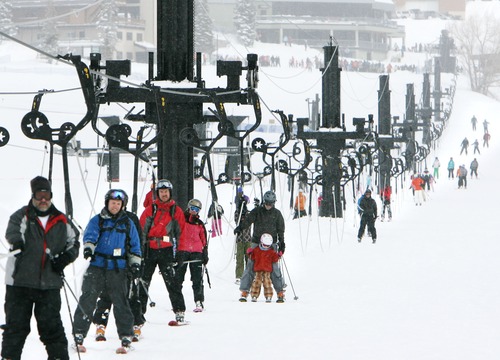This is an archived article that was published on sltrib.com in 2014, and information in the article may be outdated. It is provided only for personal research purposes and may not be reprinted.
The Alta Ski Resort bans snowboarders not for any rational reason but because the operators think they're rude and obnoxious. For that reason, snowboarders deserve protection under the 14th Amendment of the Constitution, which historically has been used on cases involving discrimination based on race, gender and sexual orientation.
That was the crux of the argument Monday in federal court where snowboarders are trying to keep their lawsuit against the Utah ski resort from getting tossed out of court.
But attorneys for the resort and the Forest Service argued that the plaintiffs, a group of snowboarders who claim they were unfairly turned back when they tried to board Alta lifts, didn't meet the thresholds for suing under the 14th Amendment, part of which seeks to guarantee basic rights under the nation's laws for all citizens.
U.S. District Judge Dee Benson heard oral arguments Monday over Alta's motion asking him to dismiss the case that was filed in January.
Robert Rice, an attorney for Alta Ski Lifts Co. that operates the resort, told Benson the snowboarders were trying to bend the protections of the U.S. Constitution too far by saying it applied to "people who chose one form of entertainment over another."
"The 14th Amendment does not contain a right to snowboard," he said, pointing out that anyone can strap on skis and buy a lift ticket because it's only certain equipment that's not allowed on the slopes.
The resort, one of Utah's most popular, made a "rational" decision to exclude snowboards as part of a business plan aimed at attracting a certain clientele and for safety and terrain concerns, said Rice.
An attorney for the Forest Service, which issues operating permits for the resort's public lands, said allowing the lawsuit to proceed could open up federal courts to a "flood of lawsuits" by people seeking approval for certain activities on federal lands, such a four-wheeler owners wanting access to the restricted Slick Rock Trail at Moab.
That would "make the courts the ultimate decider of what activities are allowed on federal lands," Bennett said.
But Jonathan Schofield, an attorney for the snowboarders, told Benson that his clients were not asserting a right to snowboard but rather to equal protection under the laws and in their treatment by the Forest Service.
"It's about deciding you don't like a group of people," he said, referring to attitudes about snowboarders who have a reputation among skiers as "riff-raff" and "dirt bags" on the slopes.
Schofield said Alta had no rational reason for the prohibition, citing a claim that snowboarders have a blind spot because of how they are attached to their boards. But he pointed out skiers are allowed to ski backward.
"All these reasons are pure pretext," said Schofield, citing a "private bias" by the owners and operators. "It just comes down to who they don't want on the mountain."
Benson appeared skeptical that the claims would fit under the 14th Amendment, pressing Schofield several times to come up with a similar previous case. Schofield admitted his case was unusual but argued there are similar ones that might stretch the 14th Amendment to cover the snowboarders' concerns.
Alta and Deer Valley in Utah and Mad River Glen in Vermont are the only resorts in the United States that prohibit snowboarders. But Alta is the only one that operates on public land, the lawsuit says.
Benson took the motion to dismiss under advisement. He gave no indication of when he might rule.



